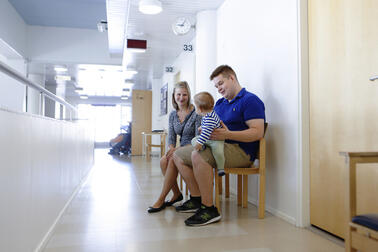
The survey was sent to a total of 3,130 informal carers, of whom 953 responded. The respondents included both informal carers of seniors and those caring for people under 65. Similar surveys were also carried out in 2013 and 2018.
Informal carers are essential in helping their family members manage at home. The work is hard, and it involves risk factors that may weaken wellbeing, such as stress. These factors affect informal carers’ managing and wellbeing significantly.
Day-to-day support helps carers manage
The survey results show that services that help make everyday life smoother are seen as the most important for wellbeing. The responses highlight the statutory days off for informal carers and other everyday services, such as home care and the related services, personal assistance, child care, cleaning services, and transport services. Rehabilitation, physical exercise and company for the person being cared for or the carer help with wellbeing.
The informal carers for people over 65 are more likely to feel they receive support from their local employees, while as many as half of the informal carers for people under 65 feel that they do not receive support from the informal care employees. Almost half of the informal carers feel that they only occasionally or never receive good support in their role as an informal carer. The experience of receiving support has weakened somewhat from 2018. The respondents wish to receive information about which services are available and how to apply for them. They would like information about informal care in general: the benefits, services and opportunities for day-to-day support available to them.
Even though the responses show that the statutory days off are extremely important, only 35% of informal carers took all or almost all of the available days off. The informal carers of people under 65 took more days off than the informal carers of people over 65. According to the survey, the most common reasons for not taking the statutory days off were the perceived quality and availability of care, the consent of the person being cared for, the lack of information, the desire to be together, the high level of care required, and the patient’s condition deteriorating due to the days off. However, some respondents also felt they did not require days off.
Moving forward with the results
Of the informal carers who responded, most feel that their informal caring is worth the effort, and the feeling of meaningfulness is the greatest factor motivating their managing.Other factors that support informal carers’ wellbeing include the experience of commitment, love, a good relationship with the person being cared for, and support from family and friends.
As for measures taken, the operations of the Activity Centre for Informal Care have been made clearer. Focus has been placed on the meetings and coaching of new informal carers. The services aimed at informal care families have also been developed to support their needs more flexibly. The support service selection for seniors’ informal care has been developed through an informal care project (2022–2023), and the development work continues.
Based on the survey, the next steps are developing services and procedures that support the work of informal carers and promoting extensive sharing of information. Senior services and informal care are currently involved in asub-project (2023–2025) of the Sustainable Growth Programme for Finland. The sub-project studies seniors’ need for family care. Meanwhile, services for people with disabilities are involved in another sub-project of the same programme, focusing on developing temporary care services. This sub-project has piloted daytime temporary care, the results of which will be assessed in the spring. At the moment, we are also looking at the value and content of the service voucher for at-home support for informal care.
This development work has been carried out in the Sustainable Growth Project, which aims to strengthen well-being and prevent problems. The project is part of the Sustainable Growth Programme for Finland, for which funding comes from the European Union Recovery Instrument (Next Generation EU). The programme is coordinated by the Ministry of Social Affairs and Health and implemented in all of Finland’s wellbeing services counties and in Helsinki.


